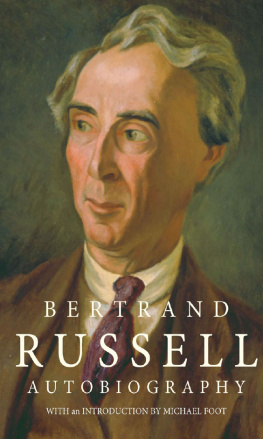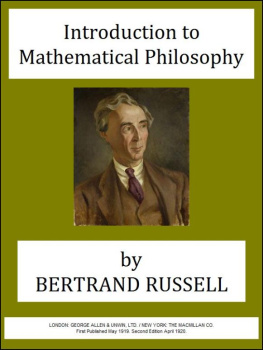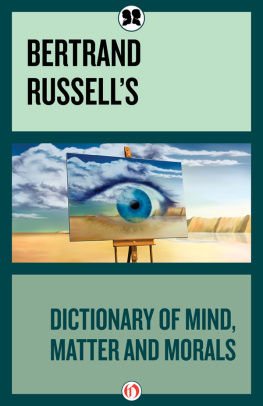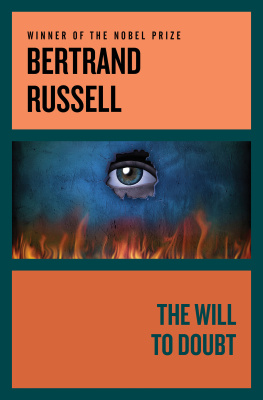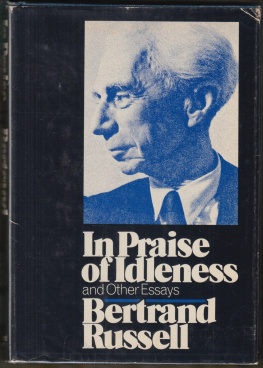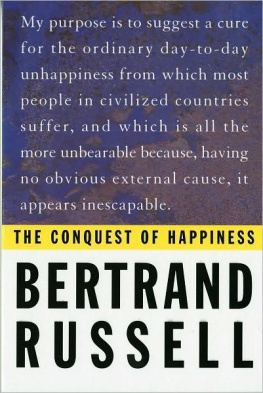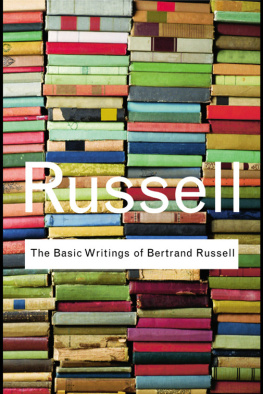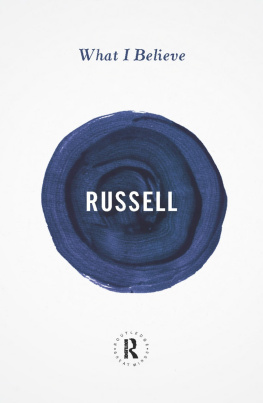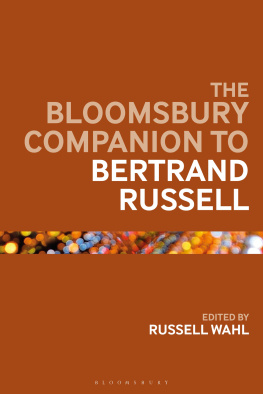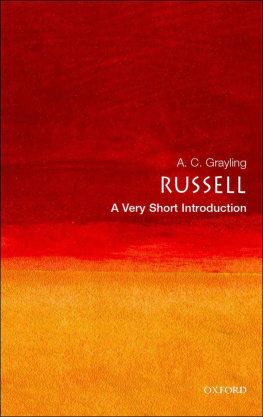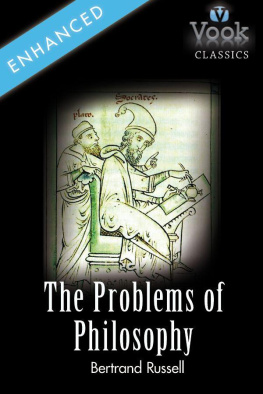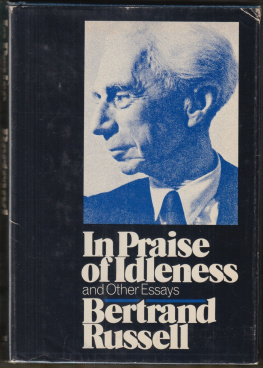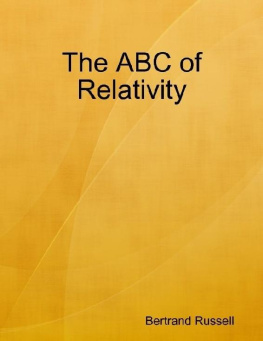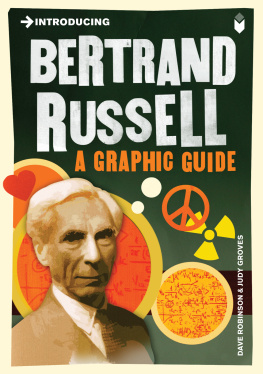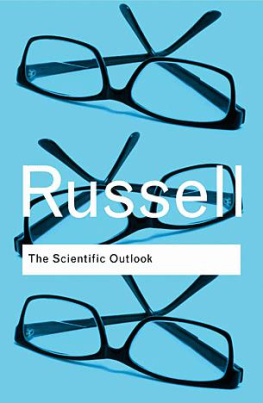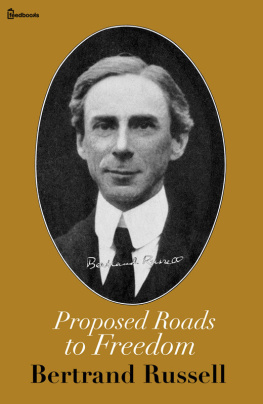Bertrand Russell - The Autobiography of Bertrand Russell
Here you can read online Bertrand Russell - The Autobiography of Bertrand Russell full text of the book (entire story) in english for free. Download pdf and epub, get meaning, cover and reviews about this ebook. year: 1996, publisher: TaylorFrancis, genre: Non-fiction. Description of the work, (preface) as well as reviews are available. Best literature library LitArk.com created for fans of good reading and offers a wide selection of genres:
Romance novel
Science fiction
Adventure
Detective
Science
History
Home and family
Prose
Art
Politics
Computer
Non-fiction
Religion
Business
Children
Humor
Choose a favorite category and find really read worthwhile books. Enjoy immersion in the world of imagination, feel the emotions of the characters or learn something new for yourself, make an fascinating discovery.
- Book:The Autobiography of Bertrand Russell
- Author:
- Publisher:TaylorFrancis
- Genre:
- Year:1996
- Rating:5 / 5
- Favourites:Add to favourites
- Your mark:
- 100
- 1
- 2
- 3
- 4
- 5
The Autobiography of Bertrand Russell: summary, description and annotation
We offer to read an annotation, description, summary or preface (depends on what the author of the book "The Autobiography of Bertrand Russell" wrote himself). If you haven't found the necessary information about the book — write in the comments, we will try to find it.
The Autobiography of Bertrand Russell — read online for free the complete book (whole text) full work
Below is the text of the book, divided by pages. System saving the place of the last page read, allows you to conveniently read the book "The Autobiography of Bertrand Russell" online for free, without having to search again every time where you left off. Put a bookmark, and you can go to the page where you finished reading at any time.
Font size:
Interval:
Bookmark:

Bertrand Russell remains one of the greatest philosophers and most complex and controversial figures of the twentieth century.
Born in Wales in 1872, the son of John and Kate Amberley and the grandson of Lord John Russell, later first Earl Russell and twice British Prime Minister, Bertrand Russell studied mathematics and moral sciences at Trinity College, Cambridge. In 1903, at the age of 31, he published his first book, Principles of Mathematics. In 1916, he lost his lectureship at Trinity College after refusing to pay a fine for writing an anti-conscription leaflet. Two years later he was imprisoned for six months for writing an anti-war article and whilst incarcerated he wrote Introduction to Mathematical Philosophy and Analysis of Mind. In 1927, he established the experimental Beacon Hill School with his second wife Dora Black. Between 1945 and 1950, he published his masterpiece A History of Western Philosophy, delivered the first Reith Lecture (Authority and the Individual) and was awarded the Nobel Prize for Literature. From 1958 to 1961 he was President of Britain's Campaign for Nuclear Disarmament and Committee of 100, resulting in his being sentenced for inciting civil disobedience. He died in Wales in 1970.
This new edition of his Autobiography, published in one paperback volume and introduced by Michael Foot, charts the remarkable life of a remarkable man, in the lucid and honest style characteristic of all his other writings.
Bertrand Russell

Volume One first published by George Allen & Unwin 1967
Volume Two first published by George Allen & Unwin 1968
Volume Three first published by George Allen & Unwin 1969
Paperback (seperate volumes) edition 1975
One-volume paperback edition 1975
First published in Unwin Paperbacks 1978
Reissued 1985
Reissued in hardback 1998
by Routledge
This edition first published in paperback 2000
by Routledge
2 Park Square, Milton Park, Abingdon, Oxon OX14 4RN
Simultaneously published in the USA and Canada
by Routledge
605 Third Avenue, New York, NY 10017
Reprinted 2004, 2006 (twice)
Routledge is an imprint of the Taylor & Francis Group, an informa business
The Bertrand Russell Peace Foundation Ltd 1996
Introduction 1998 Michael Foot
Typeset in Plantin by Intype London Ltd
All rights reserved. No part of this book may be reprinted or reproduced or utilised in any form or by any electronic, mechanical, or other means, now known or hereafter invented, including photocopying and recording, or in any information storage or retrieval system, without permission in writing from the publishers.
British Library Cataloguing in Publication Data
A catalogue record for this book is available from the British Library
Library of Congress Cataloging in Publication Data
ISBN 10: 0-415-22862 X
ISBN 13: 978-0-415-22862 6 (PBK)
ISBN 13:978-0-415-189859 (HBK)
DOI: 10.4324/9781315824499
To Edith
Through the long years
I sought peace,
I found ecstasy, I found anguish,
I found madness,
I found loneliness,
I found the solitary pain
that gnaws the heart,
But peace I did not find.
Now, old & near my end,
I have known you,
And, knowing you,
I have found both ecstasy & peace,
I know rest,
After so many lonely years.
I know what life & love may be.
Now, if I sleep,
I shall sleep fulfilled.
Acknowledgements are due to the following for permission to include certain letters. In Part I: the letters from Joseph Conrad are included by permission of J. M. Dent Ltd and the Trustees of the Joseph Conrad Estate. In Part II: Les Amis d'Henri Barbusse; Margaret Cole, for the letters of Beatrice Webb; Joseph Conrad through J. M. Dent Ltd, for the letters of Joseph Conrad; Valerie Eliot, for the letters of T. S. Eliot; the Estate of Albert Einstein; the Executors of the H. G. Wells Estate ( 1968 George Philip Wells and Frank Wells); Pearn, Pollinger & High am, with the concurrence of William Heinemann Ltd, for passages from the letters of D. H. Lawrence; the Public Trustee and the Society of Authors, for the letters of Bernard Shaw; the Trustees of the Will of Mrs Bernard Shaw; and the Council of Trinity College, Cambridge. Facsimilies of Crown-copyright records in the Public Record Office appear by permission of the Controller of H.M. Stationery Office. The above list includes only those who requested formal acknowledgement; many others have kindly granted permission to publish letters.
Acknowledgements are also due to the following for permission to include certain letters and articles in Part III: Baron Cecil Anrep, for the letters of Bernard Berenson; the Estate of Albert Einstein; Valerie Eliot, for the letters of T. S. Eliot; Dorelia John, for the letter of Augustus John; The New York Times Company, for 'The Best Answer to Fanaticism-Liberalism' ( 1951); The Observer, for 'Pros and Cons of Reaching Ninety'. The above list includes only those who requested formal acknowledgement; many others have kindly granted permission to publish letters.
A particular, persistent reason why Bertrand Russell had such appeal, throughout his ninety odd years, especially to the young, was the trouble he took to write plain English. Considering how complicated or ratified were the subjects he started writing about in his own youth or early manhood, it is all the more instructive to see how he shaped his own style for his own purpose. Was it just a gift from the gods in whom he never believed, or was it not rather a deliberate design to carry forward the tradition of intellectual integrity in which he was reared? The plainer the style, the less likely it could be used to tell lies. He would stake everything to tell the truth. The century he loved best and the language he came to love offered the best exemplars. Jonathan Swift and David Hume aimed to secure an absolute clarity and they seldom failed. Yet they continued to be read thanks to the enduring individual resonance in their writing which they also achieved.
All through his life and increasingly in the later years, as many of us believed, Bertrand Russell was given credit for a comparable combination of qualities. And yet the claim has been challenged, and the point should be disposed of at once. Ray Monk, himself a philosopher, has written a new biography of Russell in which he insists that he is dealing with the philosophical questions overlooked or bowdlerized by previous biographers or by Russell himself. His first volume, subtitled The Spirit of Solitude, takes the record from Russell's birth in 1872 until 1921. In the light of his actual text, the title might be regarded as satisfactorily restrained. What he is examining more specifically, as he indicates in an epigraph from Dostoevsky, is how nearly and constantly Russell himself trembled on the edge of despair and madness. It is indeed a very different portrait from the one drawn by the man himself who believed that he derived at least part of his inspiration from the fountain of eighteenth-century rationalism and who so often, when he was on the 'verge of despair', could still find the honest words to restore his faith in the human race. Mr Monk is a skilful operator, and his assault on Bertrand Russell's reputation responds to all those wretched instincts in the human condition which like to see great men reduced in their status. Devout Christians especially seem to be happier when free-thinkers of one breed or another are exposed as victims of the same fate as the rest of humanity. Such was the kind of venom which Dr Johnson unleashed on Jonathan Swift, Something of the same order Ray Monk has unleashed against Bertrand Russell, and there is still more to come. He himself has many qualities as a writer but not enough to stem the flow of malevolence which poisons the whole book. However, Russell did take the precaution of speaking for himself, and we are especially entitled to note how and why he did it.
Next pageFont size:
Interval:
Bookmark:
Similar books «The Autobiography of Bertrand Russell»
Look at similar books to The Autobiography of Bertrand Russell. We have selected literature similar in name and meaning in the hope of providing readers with more options to find new, interesting, not yet read works.
Discussion, reviews of the book The Autobiography of Bertrand Russell and just readers' own opinions. Leave your comments, write what you think about the work, its meaning or the main characters. Specify what exactly you liked and what you didn't like, and why you think so.

